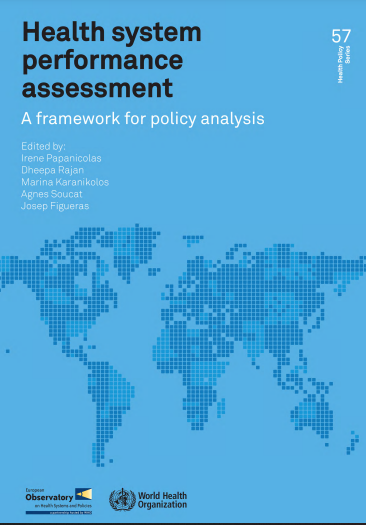Health Systems Transformation (HST)
Multidisciplinary Research Institute
Joaquim Cardoso MSc*
Chief Researcher, Editor and Strategy Officer
November 11, 2022
MSc* from London Business School — MIT Sloan Masters Program
What is the message?
- Compared to other wealthy nations, the United States is consistently behind on several measures, including ones related to primary care, access to care, and avoidable death. Take life expectancy: as the graph below shows, the U.S. peers for this measure are China, the Slovak Republic, Peru, and Argentina.
- While recognizing that many countries are already conducting health system assessments, the WHO experts make one thing clear: current evaluations need to be enhanced.
- 1.First, a more standardized assessment approach is necessary
- 2.Second, we need more metrics to form a holistic view of performance
Executive Summary
What is new?
- Earlier this year, the World Health Organization (WHO) released a how-to guide, if you will, for countries wishing to self-assess their health system performance using evidence-based tools.
- The WHO’s primary aim was to illustrate the link between how a health system is structured and organized and how well it performs overall, including the quality of health outcomes for the people served.
Why U.S. Policymakers Should Pay Attention?
- Compared to other wealthy nations, the United States is consistently behind on several measures, including ones related to primary care, access to care, and avoidable death.
- In fact, in many respects, U.S. health care is more comparable to health care in certain developing nations. Take life expectancy: as the graph below shows, the U.S. peers for this measure are China, the Slovak Republic, Peru, and Argentina.
- Perhaps the biggest reason why the U.S. should look outward for lessons on improving health care is mentioned at the very beginning of the WHO’s guide: “[H]ealth system strengthening is the principal means to achieving the shared goal of [universal health coverage].”
- Unfortunately, the U.S. remains the only high-income country lacking universal health coverage. Nearly 30 million people in the U.S. are still uninsured, while some 40 million are potentially underinsured, as out-of-pocket costs continue to limit health care access.
- The WHO singles out universal coverage as the guiding principle to accurately assessing a health system.
What are the recommendations?
- While recognizing that many countries are already conducting health system assessments, the WHO experts make one thing clear: current evaluations need to be enhanced.
- 1.First, a more standardized assessment approach is necessary
- 2.Second, we need more metrics to form a holistic view of performance
What is the urgency?
- It’s time to pick up the pace of progress.
- Beyond agreeing on the need to guarantee health care coverage for every single person, we need to assess health system performance accurately and comprehensively by using tools similar to ones the WHO highlights.
ORIGINAL PUBLICATION (full version)

Listening to the WHO: How to Assess Health System Performance
Commonwealth Fund — International Insights
Munira Z. Gunja.
November 11, 2022
Earlier this year, the World Health Organization (WHO) released a how-to guide, if you will, for countries wishing to self-assess their health system performance using evidence-based tools.
This is important to us here at the Commonwealth Fund, as we recently analyzed data on 71 measures in comparing the performance of 11 national health care systems.
The WHO’s primary aim was to illustrate the link between how a health system is structured and organized and how well it performs overall, including the quality of health outcomes for the people served.
One of the timelier questions the guide asks is: How resilient are health system functions and health system outcomes to external shocks? Climate change and pandemics immediately come to mind . . . .
One of the timelier questions the guide asks is: How resilient are health system functions and health system outcomes to external shocks? Climate change and pandemics immediately come to mind . . . .

We Need More Standardization and More Metrics
While recognizing that many countries are already conducting health system assessments, the WHO experts make one thing clear: current evaluations need to be enhanced.
While recognizing that many countries are already conducting health system assessments, the WHO experts make one thing clear: current evaluations need to be enhanced.
- 1.First, a more standardized assessment approach is necessary
- 2.Second, we need more metrics to form a holistic view of performance
1.First, a more standardized assessment approach is necessary.
Governments and health systems use different terminologies, methodologies, and metrics for the assessment process, making an apples-to-apples comparison of health system performance within and across nations difficult.
Standardization is something researchers have longed for. While we can attempt to evaluate different health system functions, it’s hard when data collection processes are completely different.
That’s why when comparisons are made, a laundry list of caveats, asterisks, and notes is required.
If assessment methods were more aligned, we could start to see what’s working, and what’s not, across the board.
If assessment methods were more aligned, we could start to see what’s working, and what’s not, across the board.
2.Second, we need more metrics to form a holistic view of performance — measures of public health, health promotion, health equity, and the social determinants, or drivers, of health.
That last one is key: health systems can no longer ignore that health is tied to all different areas of life, including the home, workplace, transportation, and access to food.
We also must consider how each of these health system attributes translates into actual outcomes, such as improvements in patient health, rather than process improvements, like workforce size or the number of hospital beds.
health systems can no longer ignore that health is tied to all different areas of life, including the home, workplace, transportation, and access to food.
We also must consider how each of these health system attributes translates into actual outcomes — such as improvements in patient health, rather than process improvements, like workforce size or the number of hospital beds.

Why U.S. Policymakers Should Pay Attention
Hundreds of countries, low-, middle-, and high-income, belong to the WHO.
Compared to other wealthy nations, the United States is consistently behind on several measures, including ones related to primary care, access to care, and avoidable death.
In fact, in many respects, U.S. health care is more comparable to health care in certain developing nations.
Take life expectancy: as the graph below shows, the U.S. peers for this measure are China, the Slovak Republic, Peru, and Argentina.
Perhaps the biggest reason why the U.S. should look outward for lessons on improving health care is mentioned at the very beginning of the WHO’s guide:
“[H]ealth system strengthening is the principal means to achieving the shared goal of [universal health coverage].”
Perhaps the biggest reason why the U.S. should look outward for lessons on improving health care is mentioned at the very beginning of the WHO’s guide: — “[H]ealth system strengthening is the principal means to achieving the shared goal of [universal health coverage].”
The “shared goal” refers to the agreement by United Nations member states that every single person should have access to health insurance.
The “shared goal” refers to the agreement by United Nations member states that every single person should have access to health insurance.
Unfortunately, the U.S. remains the only high-income country lacking universal health coverage.
Nearly 30 million people in the U.S. are still uninsured, while some 40 million are potentially underinsured, as out-of-pocket costs continue to limit health care access.
The WHO singles out universal coverage as the guiding principle to accurately assessing a health system.
Unfortunately, the U.S. remains the only high-income country lacking universal health coverage.
Nearly 30 million people in the U.S. are still uninsured, while some 40 million are potentially underinsured, as out-of-pocket costs continue to limit health care access.
The data are out there and can no longer be ignored: the U.S. continues to trail other nations on health care, often badly.
It’s time to pick up the pace of progress.
Beyond agreeing on the need to guarantee health care coverage for every single person, we need to assess health system performance accurately and comprehensively by using tools similar to ones the WHO highlights.
It’s time to pick up the pace of progress.
Beyond agreeing on the need to guarantee health care coverage for every single person, we need to assess health system performance accurately and comprehensively by using tools similar to ones the WHO highlights.
Originally published : https://www.commonwealthfund.org
REFERENCE PUBLICATION

Overview
- Health policy-making and reform require, first and foremost, a sound understanding of how a health system is performing.
- To assist countries in this process, the Health Systems Performance Assessment Framework for Universal Health Coverage offers a comprehensive attempt at guiding the collection and analysis of health system data in relation to policy goals and 21st century challenges.
- This book is grounded in the premise that any whole-of-sector assessment exercise should collect information on and examine the performance of both the functions of the health system as well as its performance goals.
- Thus, it follows through each of the health system functions (i.e., health system governance, financing, resource generation and service delivery), outlining their purpose, the sub-functions needed to fulfil that purpose, and assessment areas to evaluate how well a function performs.
- This innovative framework conceptually links health system functions to intermediate and final health system goals.
- As a result, policy-makers will be better able to determine and analyse possible origins or impact of poor performance on a particular health system outcome.
Suggested citation.
Papanicolas I, Rajan D, Karanikolos M, Soucat A, Figueras J, editors. Health system performance assessment: a framework for policy analysis. Geneva: World Health Organization; 2022 (Health Policy Series, №57).












